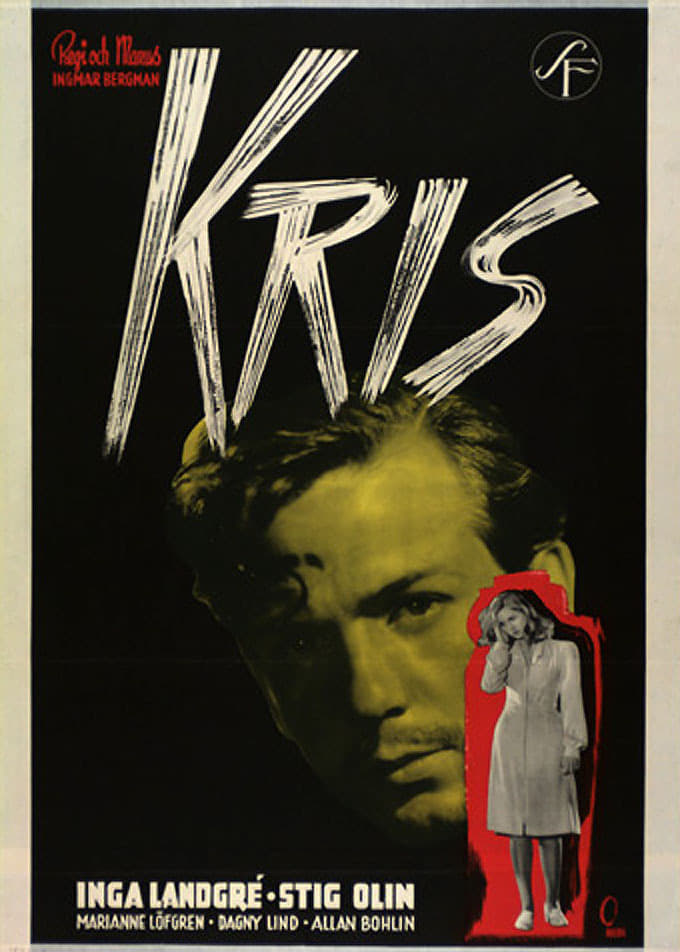
At that time, the 27-year-old already had something of a reputation in the world of Swedish drama, serving as the artistic manager of the Helsingborg City Theatre, which was turned into one of the country’s great municipal theatres under his leadership. It should not then be surprising that Crisis evinces an undeniable lack of cinematic adventure: it is plainly the work of a writer-director whose training had been exclusively theatrical up until that point.
Bergman acknowledges this rather playfully in the opening of the film, in which a stentorian narrator (whom I believe I recognize as Bergman himself, although the truth of this matter seems to have been swallowed up by history) sets the stage and openly calls the story a play, treating on matters of no particular importance, before announcing “raise the curtain!” just as a woman pulls up a window shade. This is Ingeborg Johnson (Dagny Lind), and she is one of the three women who will figure prominently in the crisis which gives the film its title.
As soon as the narrator ceases his introduction, the film properly kicks into gear, and we are quickly treated to the most obvious sign that Crisis is the work of a newbie: there is a lot of chatter in this film. As his style matured, Bergman would learn to use silence as a precision tool, most notably in the oppressively quiet Cries and Whispers of 1972. None of that yet: the cast of Crisis simply can’t shut the hell up. It’s the surest indication that this was based on a stageplay, Moderhjertet by Leck Fischer, in which the intimacy of the cinematic close-up is trumped by the need to play to the back seats, and lengthy silence is as likely to be the result of an actor losing his or her place as it is to be a distinct directorial grace note. And the dialogue is stage dialogue, although I can’t begin to explain what that means if it’s not immediately obvious.
Bergman’s familiarity with the stage had at least one good effect, however, and that is his skill with his cast. I am not the first person to suggest that he may be the greatest director of actors in the history of cinema; what I would never have suspected was that this skill was so fully formed at the start. The quartet of performances that drive the film include Lind as an ill piano teacher; Inga Landgré as her foster daughter Nelly; Marianne Löfgren as Nelly’s mother, the beauty salon operator Jenny; and Stig Olin as Jack, the homme fatale whose mysterious past ultimately wrecks multiple lives. Each of these performances is essentially perfect: Landgré stands out for being only 18 at the time of shooting and still holding her own, but there’s not a false note amongst the four. That Bergman could coax out such greatness despite his documented tensions with the actors, particularly Lind, is a sign of the same skill that would ultimately help him raise figures like Liv Ullmann, Gunnar Björnstrand, Harriet Andersson Erland Josephson and Bibi Andersson to the very highest pantheon of international cinema stardom.
Thanks to those four great performances, Crisis largely works, despite its uneven screenplay. Like Bergman’s earlier script for Alf Sjöberg’s Torment, it is unabashedly melodramatic and even soap-operatic; but Bergman was not apparently much interested in melodrama. Torment was a confusing and often dramatically inert allegory for Nazism that worked because of Sjöberg’s almost campy embrace of the material’s excess, turning pulp into an almost-parody of film noir. Even in 1946, however, Bergman was clearly attracted to the chamber drama/heightened realism that would identify all of his great films after the breakthrough The Seventh Seal, and he is mostly unwilling to follow his own script to its logical ends. There are certain scenes, such as the film’s violent climax, in which he strives for a foggy magical realism (and, it must be confessed, he fails), but mostly the film is remarkably close to his ultimate stylistic calling card: clean lines, empty spaces. The melodrama and the mise en scène are not compatible, and Bergman at this point lacked the imagination to use that conflict to his advantage, as he would later do in a film like Fanny and Alexander.
But the human core of the drama survives the director and his relative inability to direct (he was aided by the veteran Victor Sjöstrom who would later star in Wild Strawberries; one shudders to think what would have happened if he’d been all alone), and Crisis survives, although it does not thrive. It is a play on film, lacking a full visual language – but it is a good play. In one way especially, it speaks to the concerns that would circle around all of the director’s future works: as the narrator tells us almost pridefully, this is not a story of particular importance. Despite the alarming title, Crisis is a tiny domestic fable. And that is the key to all of Bergman’s films: they do not treat on the fates of the many, but on the extremely personal suffering and pain of a few. Moreover, he has never been interested in suggesting that his stories are “really” stories about the great hordes of mankind; his characters represent only themselves. It is a peculiar sort of humanism, but not ignoble. And whatever other flaws he would have to work out of his system before becoming one of the greatest of all filmmakers, for that humanism alone he was an exceptional man even at the start.
